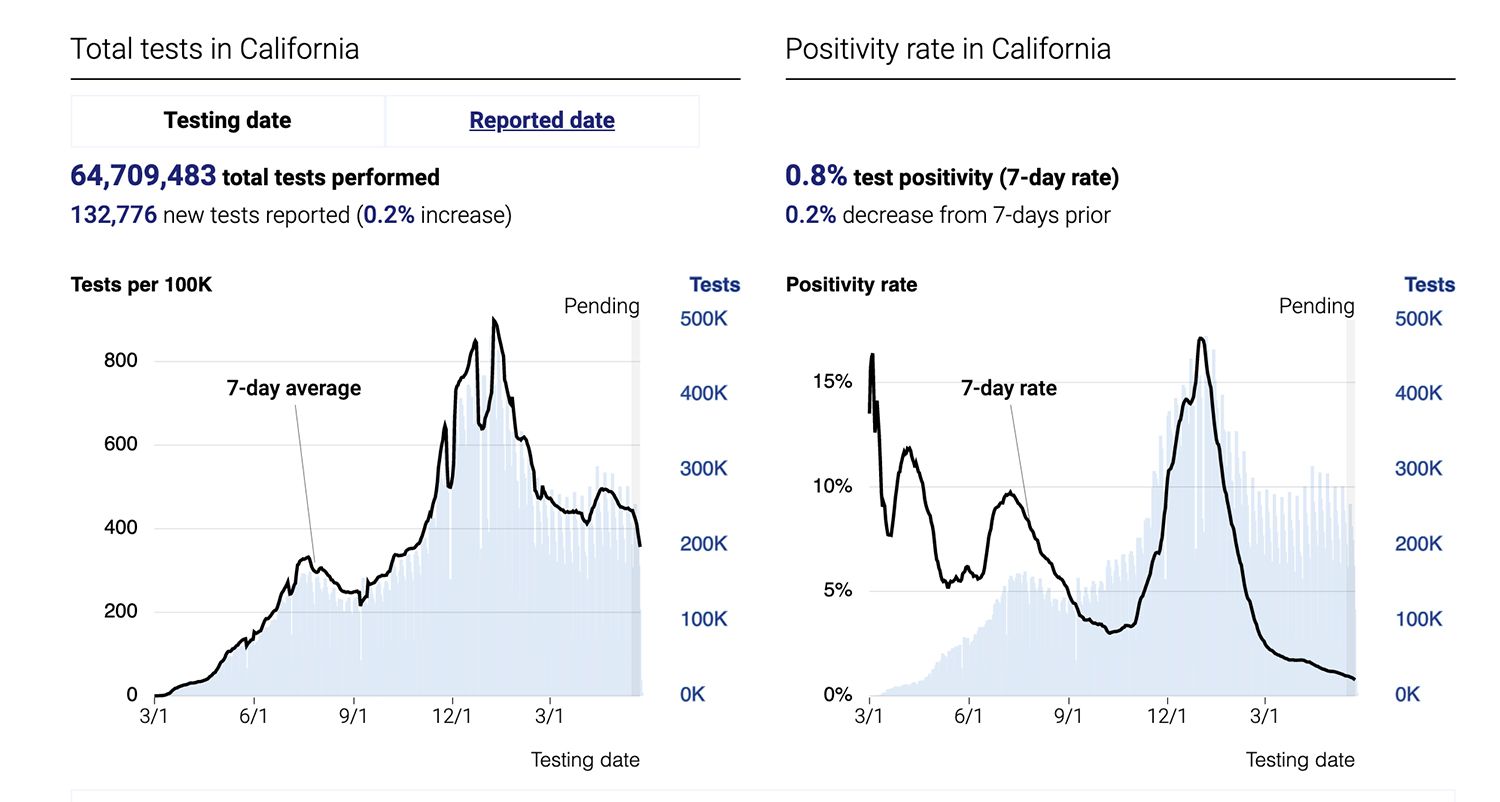As we approach the last few days of May, just three weeks out from the much anticipated June 15 date for widespread lifting of public-health restrictions, California looks poised to see fewer and fewer COVID infections.
New state data shows the statewide, seven-day COVID testing positivity rate down to the lowest it's been since the beginning of the pandemic. On the Blueprint for a Safer Economy page it's still appearing as 1.0%, but on the state dashboard it shows the positivity rate dipping to 0.8%, with the number of tests performed having gone up in the last week. That's down from 1.2% on May 1, and far below the previous dip that took place in early October, when statewide the rate hit 3.0%. And the trend is heading downward.

Hospitalizations also continue to trend downward across the state, albeit slowly — and still only 42% of state residents are fully vaccinated, which is just slightly higher than the national rate of 39.8%.
In the Bay Area, of course, rates are higher, and in San Francisco as of Monday, 58% of San Franciscans of all ages have completed their vaccine doses, and 69% have received at least one dose. If you look just at the population over the age of 16, 77% have received at least one dose.
Bay Area COVID hospitalizations, which had remained stubbornly in a plateau for all of April and into the first weeks of May, are ticking downward now and hit a new low of 241 on Monday. That is lower than at any point in the last 12 months, and around the number of hospitalized patients in the region in early June 2020.
Low levels of virus mean that the state is prepared to reopen more fully, and lift the distancing and masking rules as has been promised for June 15.
Speaking to the Chronicle today, Stanford virology and immunology specialist Robert Siegel says that the data shows that all the measures taken up until now have been effective. "It means that the prevalence is low and everybody’s risk has dropped, and that includes vaccinated breakthrough cases, it includes immune-compromised people, it includes unvaccinated individuals," he says.
Still, efforts to get more people vaccinated must continue. As of Tuesday, Moderna announced that its COVID vaccine is 100% effective in kids aged 12 to 17, opening up a potential new supply stream in addition to the Pfizer vaccine for teens, if and when the FDA approves its use.
While San Francisco, San Mateo, and Santa Clara counties have all entered the state's "Yellow" tier, three weeks before all the tiers disappear, other Bay Area counties remain stuck for now. In Tuesday's update of Blueprint assignments, Marin, Sonoma, Napa, Alameda, and Contra Costa counties all remain in the "Orange" tier for at least another week, while Solano County remains in the "Red" tier.
In other good news, and contrary to recent comments made by Dr. Anthony Fauci, our local expert Dr. Monica Gandhi says that she doesn't believe booster shots will be needed next year for either of the mRNA vaccines.
"Bodies of scientific research indicate that your immune system should offer you long-lived protection from reinfection if you’ve been vaccinated, even with the emergence of more infectious variants," Gandhi writes in an opinion piece in the Chronicle today.
She cites evidence that the body's T cell response to other severe coronaviruses is strong, and that so-called Memory B cells were found to still produce an immune response against the 1918 influenza strain in people aged 91 to 101 who had survived that pandemic. She argues that even though antibody levels may be found to decrease over time, that's "a normal adaption of the immune system, otherwise, antibodies from multiple infections seen in the past would clog up our blood." And even lower numbers of these cells will still help produce effective immune responses in most of us.
Finally, she cites the fact that coronaviruses in general can not mutate very quickly, unlike influenza. Mutations arise in periods of high transmission, but those mutations will slow considerably once more of the world gets a vaccine. "The best way to keep people safe now is to put the discussion of boosters aside and work hard on global vaccine distribution," she says.
Photo: Mufid Majnun

